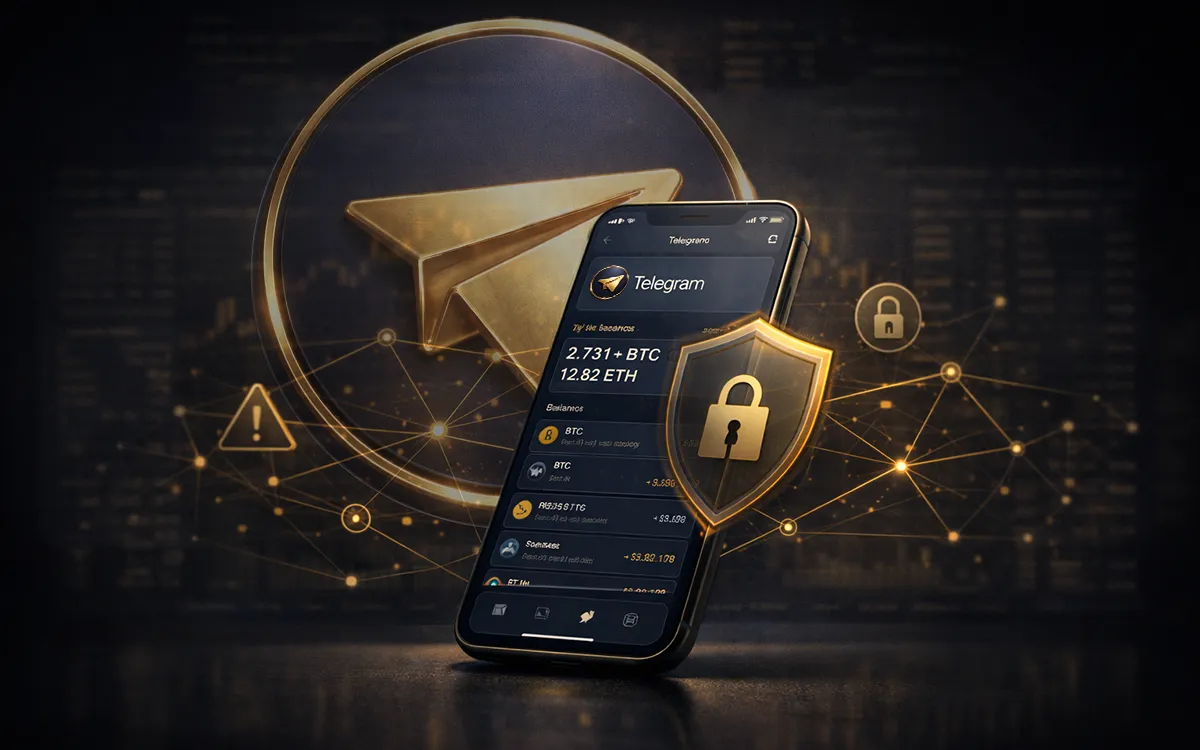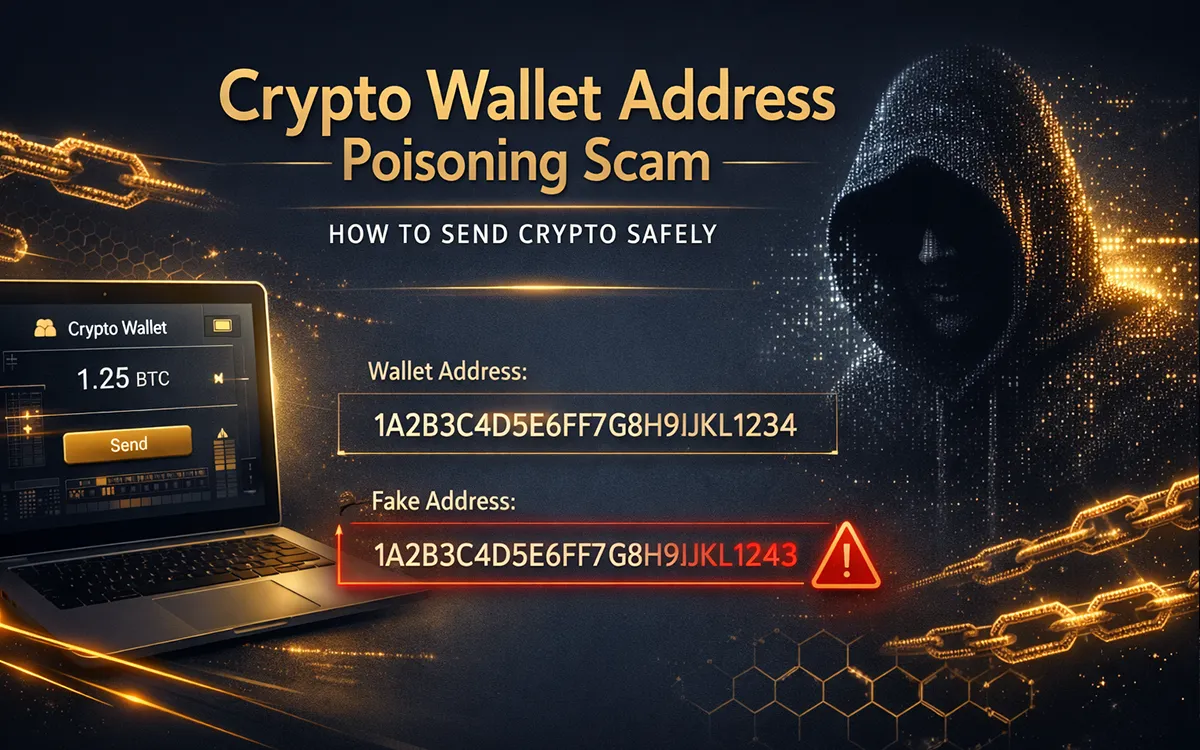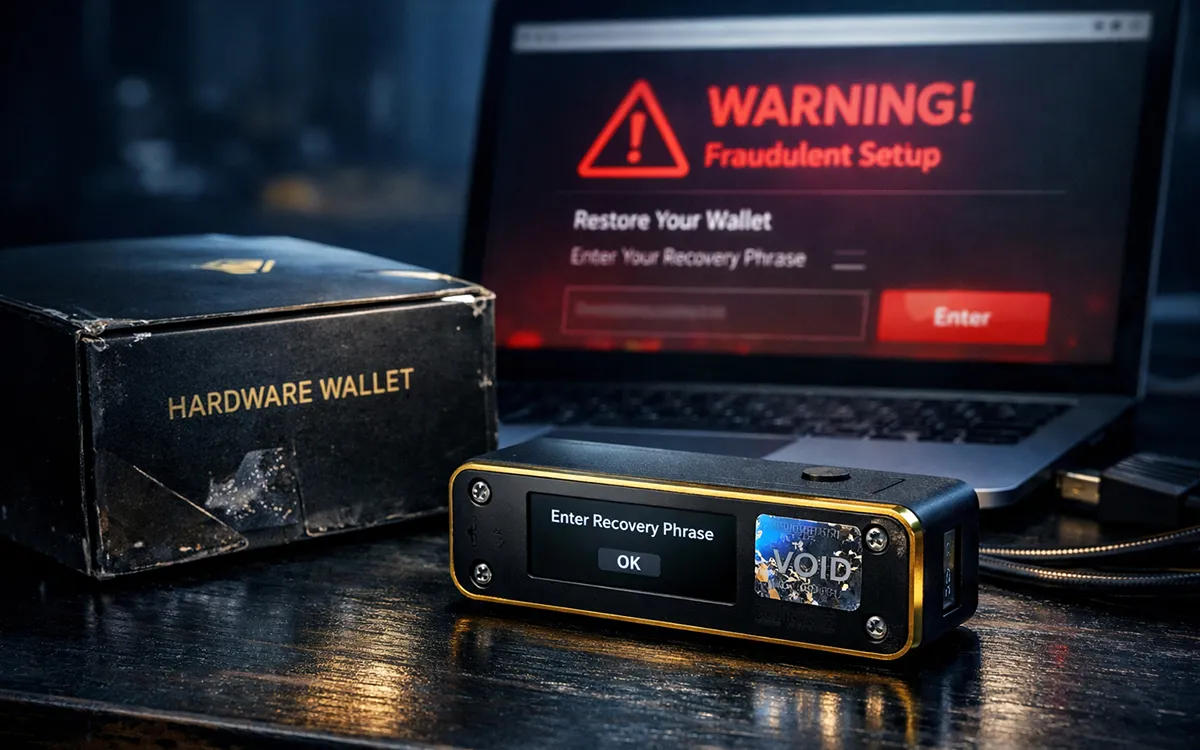
- Cryptocurrency
- May 26, 2025
Table of Contents
Have you ever received a message about a remote crypto job that promised easy money and quick tasks?
If it felt a little off, you’re not alone, and your instincts may have been right. Fake crypto jobs are on the rise, and scammers are targeting job seekers when they’re most vulnerable.
Crypto job scams are a growing threat in the online job market. Scammers often pose as recruiters or hiring managers, using real company names, fake websites, and even interviews to trick people into completing “tasks” or sending money in crypto.
Many are cleverly disguised as remote work opportunities, high-paying tasks, or so-called crypto task scams, where you're asked to “boost engagement” or “test” platforms in exchange for crypto rewards. Many victims are told they need to pay upfront for training, software, or to unlock their earnings, but the job never existed.
According to the U.S. Federal Trade Commission (FTC), Americans reported over $220 million lost to job scams in just the first half of 2024. Shockingly, nearly $41 million was lost through cryptocurrency payments, a massive jump from $21 million in all of 2023. In fact, crypto is now the #1 way scammers collect money from fake job offers.
These scams don’t just cost people money; they can steal identities, drain savings, and leave victims emotionally shaken. Whether you’re job hunting in crypto or just curious about remote work offers, knowing the red flags and how to stay safe is more important than ever.
In this article, we'll show you what the crypto job scam is like, what the typical red flags are, and how you can proceed if you were the target.
What are Crypto Job Scams?
Crypto job scams are fake work opportunities designed to steal money or personal details from job seekers. These scams usually promise high pay for simple work in the crypto space, like completing basic tasks or promoting a new project. But in reality, they lead to financial loss, often involving cryptocurrency payments.
You might receive a fake job text message or a friendly offer on Telegram or LinkedIn. It could sound like a real opportunity in crypto recruitment or remote work. Scammers often use company names, logos, or fake HR profiles to appear legitimate. This makes it hard to tell the difference between a real offer and a fraudulent job scam.
So, how do these scams usually work? Most begin with a too-good-to-be-true offer. You’re told you’ve been hired, no interview needed, and then asked to pay for training, account setup, or access to a crypto wallet. Sometimes you're told you’ll get that money back after your first task. But once you pay, either the scammer vanishes or keeps inventing more fees.
If you’re wondering how to tell if a job is a scam, look for red flags like payment requests before work, poor grammar in messages, or unusual platforms like WhatsApp being used for communication. A real company won’t ask you to invest first or pay to get a job.
Whether it's a crypto task scam, a fake crypto job, or a general remote work scam, always take time to verify the offer. Look up the company, check their official career page, and be cautious of any job that promises fast money without much effort.
How Crypto Scammers Trick Job Seekers?
Are you looking for a job in the exciting world of cryptocurrency? As crypto becomes more mainstream, the demand for jobs in the industry is skyrocketing. But unfortunately, so are crypto job scams. In fact, the rise of these fraudulent job offers is becoming a major concern for job seekers. How do crypto scammers operate, and what can you do to protect yourself?
How Do Crypto Job Scams Work?
Crypto job scams are often cleverly disguised as legitimate employment opportunities in the fast-growing world of cryptocurrency. Scammers typically use fake job listings that seem enticing, offering high salaries or remote work opportunities. They know how to tap into the desire for financial freedom and flexible work hours, which is why these scams are so effective.
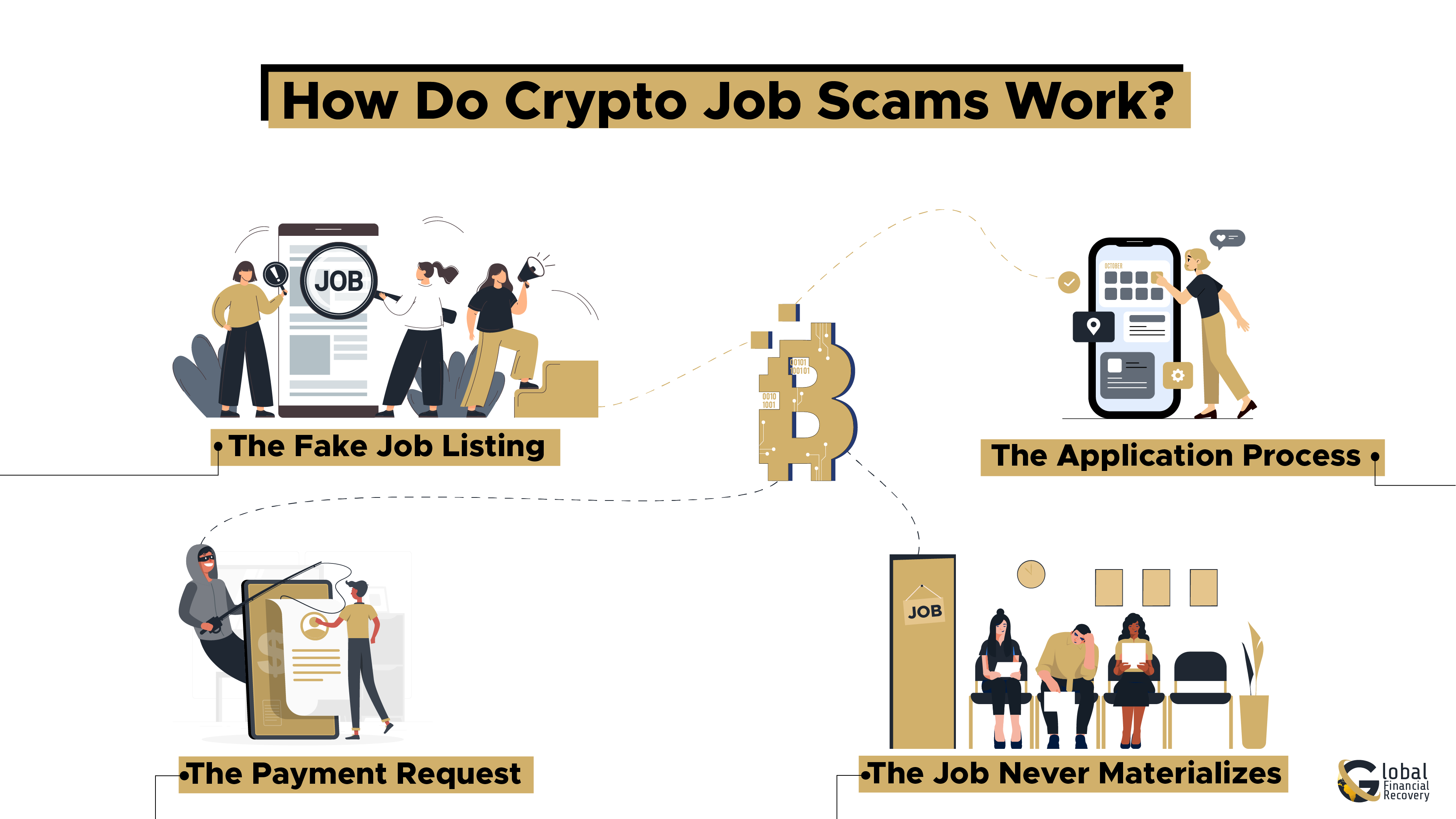
With more people looking for remote jobs, fraudsters are taking advantage of this trend to target vulnerable job seekers. Here's how these scams usually unfold:
-
The Fake Job Listing
Scammers create job posts that appear to come from well-known companies in the crypto space. These listings often promise roles like “Crypto Analyst,” “Blockchain Developer,” or “Crypto Project Manager,” with salaries that are well above industry standards. They may even use official-looking logos and language to make the listing seems legitimate.
- The Application Process
Once you apply, the scammer might request an online interview. These interviews often feel rushed or informal, with very little detail about the job itself. The interviewer might claim they are working remotely, creating a sense of urgency and excitement. If the interview goes well, the scammer will usually ask for payment upfront for "training fees" or "processing costs."
- The Payment Request
This is when the scam becomes clear. The scammer asks for a deposit or a series of payments in exchange for a job placement. They might suggest using cryptocurrency for payments, making it harder to trace the transaction. The scammer may even promise that the money is refundable once you’re hired, but in reality, it’s gone.
- The Job Never Materializes
After paying the required fees, the scammer disappears. The "job" is never real, and your money is lost. The scammer might also try to steal your personal information for identity theft purposes.
Types of Crypto Job Scams
|
Sr No |
Type of Crypto Job Scam |
Description |
Red Flags/Signs |
Quick Tips/Facts |
|
1 |
Crypto Task Scam |
You’re promised crypto for completing simple tasks, but are asked to pay a small fee to unlock your earnings. |
Asking for a "release fee" or "gas fee" after completing tasks. |
More than $1 million was stolen through crypto task scams in 2024. |
|
2 |
Fake Recruitment Scam |
You’re hired quickly with no interview, but are asked for wallet info or payment for training/software. |
Quick hire with no interview, demands for payment before starting. |
Research the company and check job reviews. |
|
3 |
Phishing Through Job Portals |
Fake job portals steal your personal data after you upload your resume or apply for a job. |
Malicious links or attachments in emails. |
Always check the URL and confirm legitimacy. |
|
4 |
Smart Contract Job Scams |
A malicious smart contract is presented as part of a job offer, and once signed, your wallet is drained. |
Contracts requiring wallet access. |
Always read the fine print of any contract. |
|
5 |
Fake Airdrop Jobs |
You’re promised tokens for completing tasks like airdrop campaigns, but the job doesn’t exist. |
Requests to connect your wallet for tasks or "verification." |
Be cautious with airdrop campaigns; research them! |
|
6 |
Crypto Multilevel Job Scheme |
You’re asked to recruit others for a job, but you must pay upfront to participate. |
Request for upfront payment to join. |
Don’t pay for a job; legitimate jobs don’t require fees. |
|
7 |
DeFi Intern Scams |
Promises of unpaid internships in DeFi, but they ask for a deposit to “unlock” your account. |
Request for upfront payment before starting the internship. |
Never pay for an internship; research the company first. |
|
8 |
Telegram & Discord Job Drop Scams |
Jobs are offered via messages in crypto Telegram or Discord groups, rushing you into making quick decisions. |
Urgency in decision making, messages from unverified sources. |
If rushed, it’s a red flag. Legit companies allow time for thought. |
|
9 |
Fake Wallet or App Install Scams |
You’re convinced to install a fake crypto wallet or app, which steals your credentials. |
Requests to install an app or wallet for "job purposes." |
Verify apps before installing them. Only use trusted wallets. |
|
10 |
Impersonation of DAO/Blockchain Projects |
Scammers pose as real blockchain projects, offering fake jobs with contracts that require payment. |
Fake job listings, official-looking documents, and vague job descriptions. |
Always verify job listings with official project websites. |
Common Crypto Job Scam Red Flags to Watch For
Crypto jobs may seem thrilling, with remote jobs, great pay, and a flexible schedule. But how do you know what's legitimate and what isn't a scam? If you're looking for a job in the world of crypto, it's best to know the job scam warning signs before you get swept up in a bad deal. Here's a concise explanation of the warning signs of crypto hiring scams and how to avoid them.

1. They Ask You to Pay Money Upfront
Would a real job ever ask you to pay before you start?
Scammers often request money for things like “training,” “equipment,” or “registration.” In reality, legitimate employers never charge you to get hired. Paying fees upfront is the number one red flag in fake crypto job offers.
Red flag: "Send 0.02 BTC to secure your onboarding slot."
2. Job Description Is Vague or Generic
Do you really know what you're applying for?
Fake job posts often sound impressive but lack real detail. For example, a listing might say, “Crypto Project Manager Needed: Earn $5,000/Week,” but provide no description of daily tasks or required experience. This tactic is used to lure desperate job seekers who don’t notice the lack of specifics.
Red flag: No clear duties, qualifications, or company background.
3. Over-the-Top Pay and Perks
Is the offer too good to be true?
Scammers use unusually high salaries to lure applicants quickly. A job promising $120K for entry level remote crypto work should raise a red flag., Many crypto job scams advertise "instant income" or "daily crypto payments."
Red flag: “Make $1,000 a day working from your phone!”
4. Unusual Communication Channels
Why are they interviewing you over WhatsApp or Telegram?
While some crypto companies use Telegram, scammers rely heavily on encrypted messaging apps to avoid detection. If a recruiter insists on communicating outside of email or standard hiring platforms, proceed with caution.
Red flag: The interview takes place via Telegram or a suspicious messaging app only.
5. Pressure to Act Fast
Are they rushing you to decide today?
Scammers use urgency to stop you from thinking critically. You might hear phrases like “We need your decision in 24 hours” or “Slots are limited.” Real companies will give you time to think and do your research.
Red flag: “Confirm your position today, or it will be given to someone else.”
6. No Online Presence or Fake Company Pages
Can you even find the company online?
If a company seems suspicious, Google it. Look at their website, check for real LinkedIn employee profiles, and verify their presence in the crypto space. Many scams use fake or cloned websites to appear credible.
Some fake crypto firms copy branding from real companies and even run phony interviews pretending to be them.
Red flag: Website looks off, no LinkedIn presence, or mismatched company details.
7. You’re Hired Instantly, With No Effort
You got the job without an interview?
If you’re offered a position without a proper interview or skills test, be careful. Scammers want to skip formalities and move you straight to the money part.
Red flag: “You’re perfect for the role; we’d like to hire you today!”
Examples of Crypto Job Scams
Don’t think it could happen to you? These stories show just how convincing scammers can be.
1. The “Crypto Task Assistant” Scam
What happened:
A 24-year-old job seeker received a message on Telegram offering a remote job helping a crypto startup “Boost their platform visibility.” The job involved simple online tasks like liking videos and following accounts. After a few easy assignments and small rewards, the company asked him to “unlock higher earning tiers” by depositing crypto into a smart contract.
He deposited $300 worth of ETH, and then the recruiter vanished. No job. No money. No reply.
2. The Fake Company Interview
What happened:
A woman applied for a “Marketing Specialist” role listed on a major job board. She was contacted by a hiring manager who claimed to represent a crypto exchange. The interview happened over WhatsApp, and she was told she got the job the same day.
She was then asked to purchase a software license for remote access tools. It cost $500 in Bitcoin. Once she paid, communication stopped. Later, she realized the job post had been removed, and the company she “worked for” wasn’t even real.
3. The “High-Paying Entry-Level Job” Trap
What happened:
A college student got a message on LinkedIn offering a remote customer support job at a Web3 startup. The role promised $5,000 a month and required no experience. He was offered the position within 10 minutes of replying.
The recruiter then sent a contract but also asked him to send crypto “to activate the employee dashboard.” He sent $150 in USDT. The dashboard never loaded, and his messages were ignored.
How to Protect Yourself From Crypto Job Scams?
When you are in search of a crypto job, it is advisable to be cautious and take a few extra precautions to secure yourself from fraudsters.
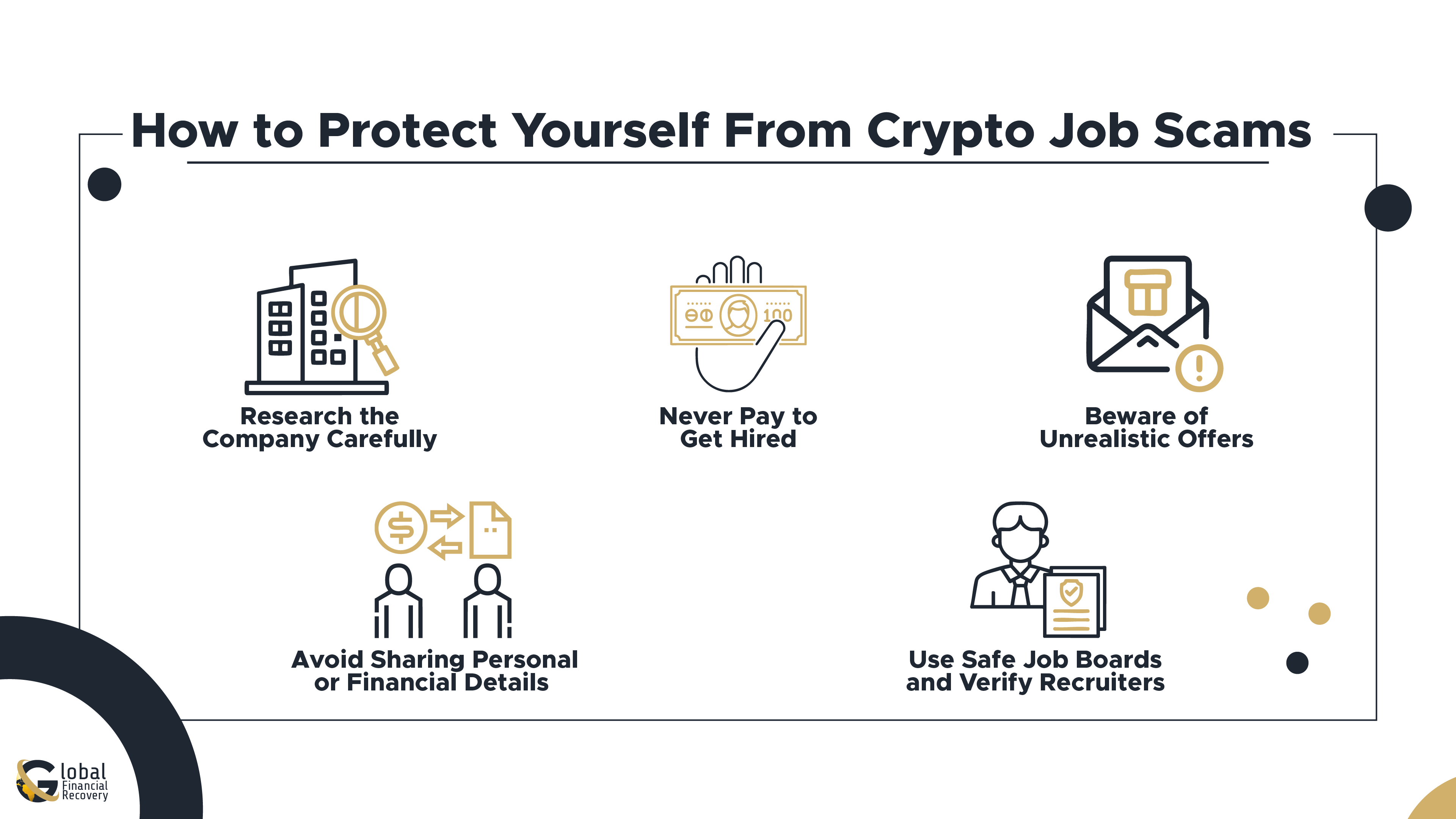
First, always check if the firm you are applying to is real or not. Do a quick search online to see if they have an actual website, LinkedIn profiles, and if anyone is discussing them online. If the site seems odd or the firm can't be easily located, it may not exist.
Another huge red flag is if they require you to pay something upfront, such as training or software. No genuine company will make you pay to be hired. Also, be careful if the interview is conducted via messaging apps like WhatsApp or Telegram alone; most legitimate companies conduct interviews via proper platforms like Zoom or email.
Ensure that the job description sounds realistic as well. If it sounds too good to be true or is very unclear, it likely is. For instance, if a job pays you $5,000 per week for little work, it is most likely a scam.
Never be rushed to make choices or send funds in a hurry. Legitimate employers will afford you time to question and process. And trust your instincts; if something feels wrong, that's exactly what it is.
Giving yourself a few extra minutes of research and posing the right questions can prevent you from falling for a scam. Keep in mind that being informed and vigilant is the best means of safeguarding yourself while looking for work in the crypto space.
What To Do If You’ve Been Scammed?
If you've fallen for a crypto job scam, don't panic; you're not alone, and help is available. Here are simple steps you can take right away to protect yourself and possibly recover your funds:
|
Action |
Description |
|
Report the Scam |
Contact authorities like the FTC (U.S.) or ACSC (Australia) to help track scammers. |
|
Secure Your Accounts |
Change passwords, notify your bank or crypto platform, and freeze accounts if necessary. |
|
Contact Support |
Inform your bank or crypto platform about any financial loss. |
|
Consider Fund Recovery |
Look into expert crypto recovery services to track and recover funds. |
|
Seek Support |
Join online forums or groups for advice and to connect with others who've been affected by similar scams. |
Be Crypto Smart While Job Hunting
As the crypto job market grows, so do the risks of falling victim to scams. It’s important to stay vigilant and follow best practices when searching for crypto related job opportunities. Always research employers, avoid offers that seem too good to be true, and be cautious with personal information. By understanding the common signs of crypto job scams and applying scam prevention crypto techniques, you can safeguard your personal and financial security.
Whether you are new to crypto job recruitment or are a seasoned job applicant, never forget that crypto job security begins with awareness and prudence. Stay aware, question, and always follow your gut when uncertain. By being crypto-wise, you can comfortably move around the crypto employment sector without being swindled by fake job advertisements.
Need Help Recovering Stolen Crypto?
FAQs (Frequently Asked Questions)
This scam involves fake recruiters sending “job drops” (quick freelance gigs) via Telegram groups. They claim urgent hiring for a crypto project and offer high crypto pay, but you’ll often be asked to buy tokens or pay to “verify your account.” It’s a trap.
This is when the same scammer or group posts multiple fake jobs on different platforms. Victims may apply for more than one without knowing it’s all run by the same scam ring.
A crypto task scam tricks you into completing fake “job tasks” like promoting coins or clicking ads, claiming you’ll get paid in crypto later. Scammers use this to make you feel invested, then ask for a “withdrawal fee” or “unlock fee” to access your earnings. These fees are fake, and you’ll never get paid.
Some scammers fake urgency by saying, “Another candidate is ready,” or You must pay a gas fee or sign up right now to secure the job. This psychological tactic, called front-running in this context, pressures you into fast action, often leading you into a trap.
Fraudsters adopt popular crypto terms such as DeFi (decentralized finance) or DAO (decentralized autonomous organization) to look legitimate and innovative. Most of these employment opportunities are fake and unregistered in real life. Many times, always inquire whether the company has an actual white paper, community, or product.

